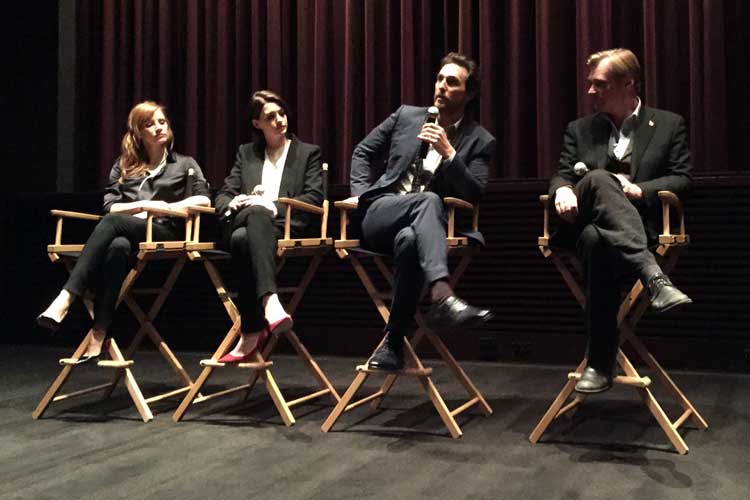The following questions and answers are excerpted from a conversation that followed the NBR screening of Interstellar.
[Note: Spoilers ahead]
Mr. McConaughey, how did you approach Cooper?
I always saw Cooper as a man out of time. Early on, Chris and I were talking about him being the ‘every man.’ I remember going to Chris after a few weeks of thinking that over and just saying, “I don’t know who that is… how can I think about that?” I don’t know who that is today, really, but I understood that he needed to be accessible and someone that people could relate to. He’s a guy who has been widowed, he’s been literally and figuratively grounded – NASA’s no longer being funded so he’s stuck on the Earth doing his duty, raising his children – but he still has a lot of spite, I think, and even fear that he may go through life without being able to live his dream. So when that dream comes knocking again, he’s got to say goodbye, because he’s got a chance to save mankind. I always wanted to make sure – whether it was said or not – that there was a personal quest for him, to get to live his dream. A pretty selfish quest, really, but one that motivated him to make the choices he does.
It was fantastic to play a woman who saves the world!
Ms. Hathaway, your character has a very different history than Cooper. What shaped your understanding of her?
Dr. Brand is someone who was raised by a great man. And it’s said that great men don’t always make great fathers; you’re lucky if you get both. While I thought she was someone who had a tremendous amount of respect and awe for her father, I wasn’t sure if they really had a ‘cozy’ relationship. There’s a scene in the movie between Mathew’s character and mine where I ask him, “couldn’t you have told your daughter you were going off to save the world,” and he says, “no, because I wanted to make her feel safe, and to make your child feel safe you don’t tell them that the world is coming to an end.” And I remember reading over that scene one day, and a light bulb went off for me, in regards to my character: I realized she’s known the situation on Earth since she was seven years old, there’s no way that secret could have been kept from her. So she actually grew up in a world separate from everyone else. And this helped me understand what she’d be like after growing up in that kind of isolation, that she’d be socially impossible. As the film progresses, the longer she spends with the other characters, the more she relaxes around them.
Ms. Chastain, your character has a complicated relationship with an absentee father, and also an adopted father figure.
One thing I discovered through doing press for the film – which I didn’t even know when we were shooting – is that my character was originally written as a man. And I was so moved to learn it had been changed! Because I see themes involving the father/son relationship so many times in film and in writing, and I think the father/daughter relationship is really subtle and important, and underrepresented. So it was a great thing to get to play a woman who accomplishes so much. She’s actively participating in the world around her: I got to be the one who decides to turn the car around, to drive through the corn, to light the corn on fire… All of these activities I wouldn’t normally be doing. At one point, Topher Grace even turned to me and said, “why do I feel like the girl here?” And I said, “Ah ha…! Welcome to life as an actress.” So it was wonderful to have the arc of the character that was provided – the thaw of having the physics be the barrier of love – and then actually finding love through physics, which I thought was great. But it was fantastic to play a woman who saves the world!
Mr. Nolan, In many of your films incredibly intricate plots revolve around fairly straightforward emotional arcs for your characters. How do you integrate these two different elements when you’re creating the film?
To achieve the proper balance of these two things, it’s primarily done in the writing phase. When you’re on set, you can only work on one thing or the other. And then the crosscutting in the edit suite is what brings it to life. In other words, because you shoot films non-linearly, calibrating the balance you’re asking about has to be done in the script stage. I think, for me, it’s always been about trying to achieve a kind of emotional clarity, and the more complicated the ideas that you’re trying to put in, or the different layers you’re trying to get in there, the more important it is to have very simple and clear emotional beats. I’ve consistently made films that reward the viewer for simply taking it all in and enjoying it, as opposed to studying the technicalities and the science as though there’s going to be a test at the end. And I think the reason for that is that I always try to write as if I’m an audience member just watching the story unfold. And for me as an audience member, it’s about a connection with the characters and whatever their emotional beats are that keep me hooked into the film. I’ve always tried for emotional clarity, no matter how complicated other aspects of the story might become.

